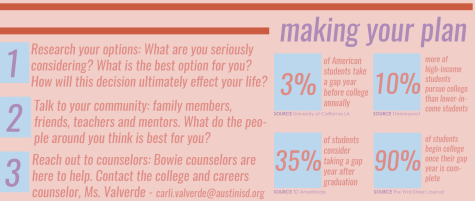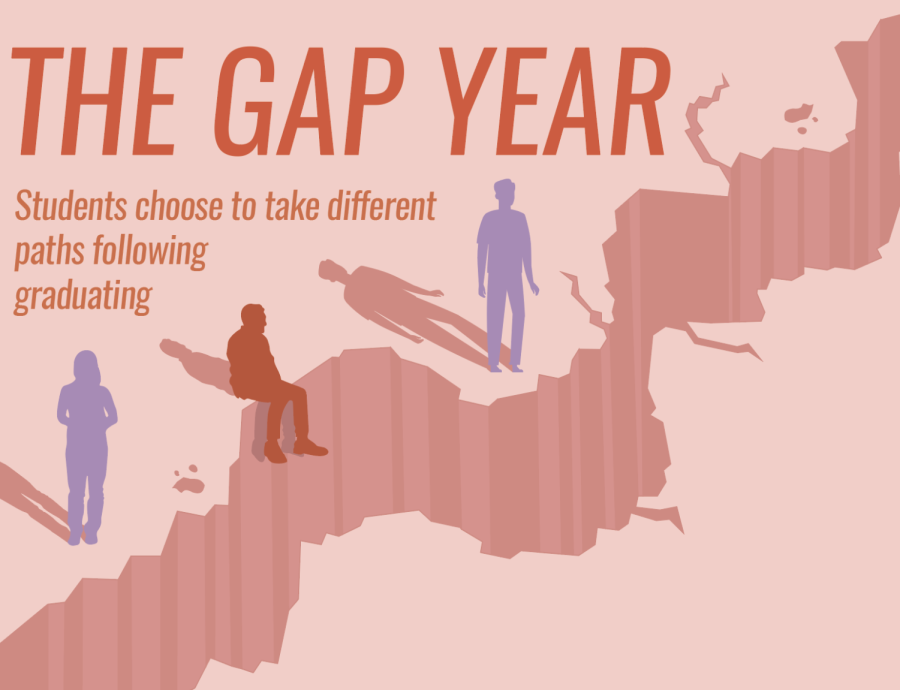The gap year
Students choose to take different paths following graduating
A gap year, in terms of high school, is when a student takes a year after graduating high school to work, travel, volunteer, etc. After the year, they will enroll in a university or community college.
June 14, 2023
As he scrolls through his Instagram feed, senior Kian Yates sees post after post of his classmates’ college decisions.
He begins to think of his future. Though he is proud and supportive of his friends, he does not doubt his decision to go down a different path.
“My primary objective after graduating high school is to travel to Europe, more specifically my ancestral country of France,” Yates said. “I’ll be joining some passionate volunteering groups while picking up the language and learning the culture.”
More commonly, graduating high school students decide to complete a four-year degree plan. This entails leaving for college the fall semester following graduation. Though most popular, this is not the only path for students.
“I chose to leave America to experience something new and different from what I’ve been accustomed to,” Yates said. “I want to challenge myself to break out of my comfort zone and explore. So, going out of the country was the clear choice.”
One of many alternative options is taking a gap year like Yates. A gap year, in terms of high school, is when a student takes a year after graduating high school to work, travel, volunteer, etc. After the year, they will enroll in a university or community college.
“Students may want to take a gap year to give themselves more time to figure out who they are and what they want to do in life,” student Counselor Laura Rodriguez said. “They may want to give themselves some time to save money for college, try out working in a certain career field, or give themselves more time to make a decision on which university they want to attend.”
As Rodriguez mentioned, there are many different paths within the idea of a gap year. Senior Nic Ospina is an example of that, his gap year plans differing greatly from Yates’.
“My plans after graduation are to travel, start my own business, and spend time with my loved ones,” Ospina said. “For the business, I plan to start building my photography into a full time job that yields good profits.”
Though the decision to take a gap year after graduation may be uncommon, it is not completely unheard of. The Gap Year Association, a nonprofit that helps students access gap year opportunities, estimates that on average, between 40,000 and 60,000 students take a gap year every school year in America. Compared to the American high school student population of 17.2 million, that is still a very small number.
“We do not have very many Bowie students that take a gap year,” Rodriguez said. “The majority of our students attend a four-year university or community college right after high school.”
The small number of gap year students may be attested to strong societal pressures to attend a four-year university right after high school.
“There is definitely an immense pressure on those who are graduating high school to immediately apply and attend a four year university,” Yates said. “I can attest to this as I, myself, have not been encouraged to take the gap year by many, even my family. Though I believe there is some merit in encouraging one to pursue their education, I also believe that us students have been in the public school system for most if not all of our memorable life and deserve a period of time to find our passion and eventually the path we will follow into adulthood.”
Students may also be deterred from taking a gap year out of fear of being behind their peers academically and socially. Some might fear missing out on certain college experiences their friends are having and the witness in the media.
“It’s embedded in the media and everywhere,” Rodriguez said. “The reality is that everyone is different and that might not be the best option for everyone. There are other paths that individuals can be just as successful in.”
Yates believes that a college degree is something society puts pressure on students to get. Much of how a society judges a person based on the degrees they have obtained, or not.
“Pressure on youth relates to university being a consistent source of stability for the future,” Yates said. “It’s quite hard to get a decent paying job without a college degree in this day and age. Whether that be for better or worse, I’m not sure.”
Another prospect that may bring students and parents fear of taking a gap year is the possibility that the student may decide not to go to college after their time out of an academic setting.

“Statistically, students that take a gap year are less likely to attend a four-year university than those that attend right after high school,” Rodriguez said. “I think that the reason is because of the decline of momentum. It’s more difficult to jump back in rather than keep going.”
According to the Education Data Initiative, the average cost of college tuition in the U.S. for undergraduate students has more than tripled, multiplying by 3.15 times over that last 58 years. In 2022, the average is $35,551 per student per year. For many students, the substantial cost of higher education may not be worth it, especially with the uncertainty of how useful the degree will be in the long run. To Ospina, the pros of taking a gap year outweigh the cons.
“For me I chose a non-traditional plan because I simply cannot afford to go to college without a concrete idea and plan of what I want to get in return,” Ospina said. “Having to pay for most of my own tuition just makes you really think about the value of a traditional path. Most of my family got a traditional four-year college education. Not a single one of them is currently using their diploma, and with how expensive school is nowadays it is simply not smart to go just because that’s what you’re supposed to do.”
Along with saving money, a gap year may give students a positive outlook on their lives.
“For me, the biggest benefit is being able to really figure out what my plan in college is,” Ospina said. “Having time to know myself as an adult I feel would help guide me in the direction I want to go.”
In an interview Joe O’Shea, Dean of Undergraduate Studies at Florida State University did with the U.S. News, he remarked that a gap year can better prepare a student for college. He commented that the natural break between high school and college is the ideal time for students to reflect and explore their options moving forward.
O’Shea notes that gap years students will get a broader sense of the world and their place in it, helping to nurture students with motivation and purpose that can animate their college experience.
“No one should expect to fully figure themselves out from a gap year, but just one year to clear your mind and set a path or goal for yourself has statistically shown improvements in academic success later,” Yates said.
Students thinking of taking a gap year need to determine how it will ultimately help them, and what the best path is for them.
“Talk to the adults in your life and explore all of the available options,” Rodriguez said. “Take career assessments. You may be surprised at your results and learn about career paths that you may not have originally considered. It’s okay if you don’t know exactly what you want to do. Most adults have been there before, it just takes time and it’s all trial and error. Try things out. If it doesn’t work out, it’s okay, try something else.”
According to Yates, it is important to stay true to yourself when making plans for your future.
“Trust your own instincts, only you can choose how you will inevitably turn out so don’t let others make that choice,” Yates said.










